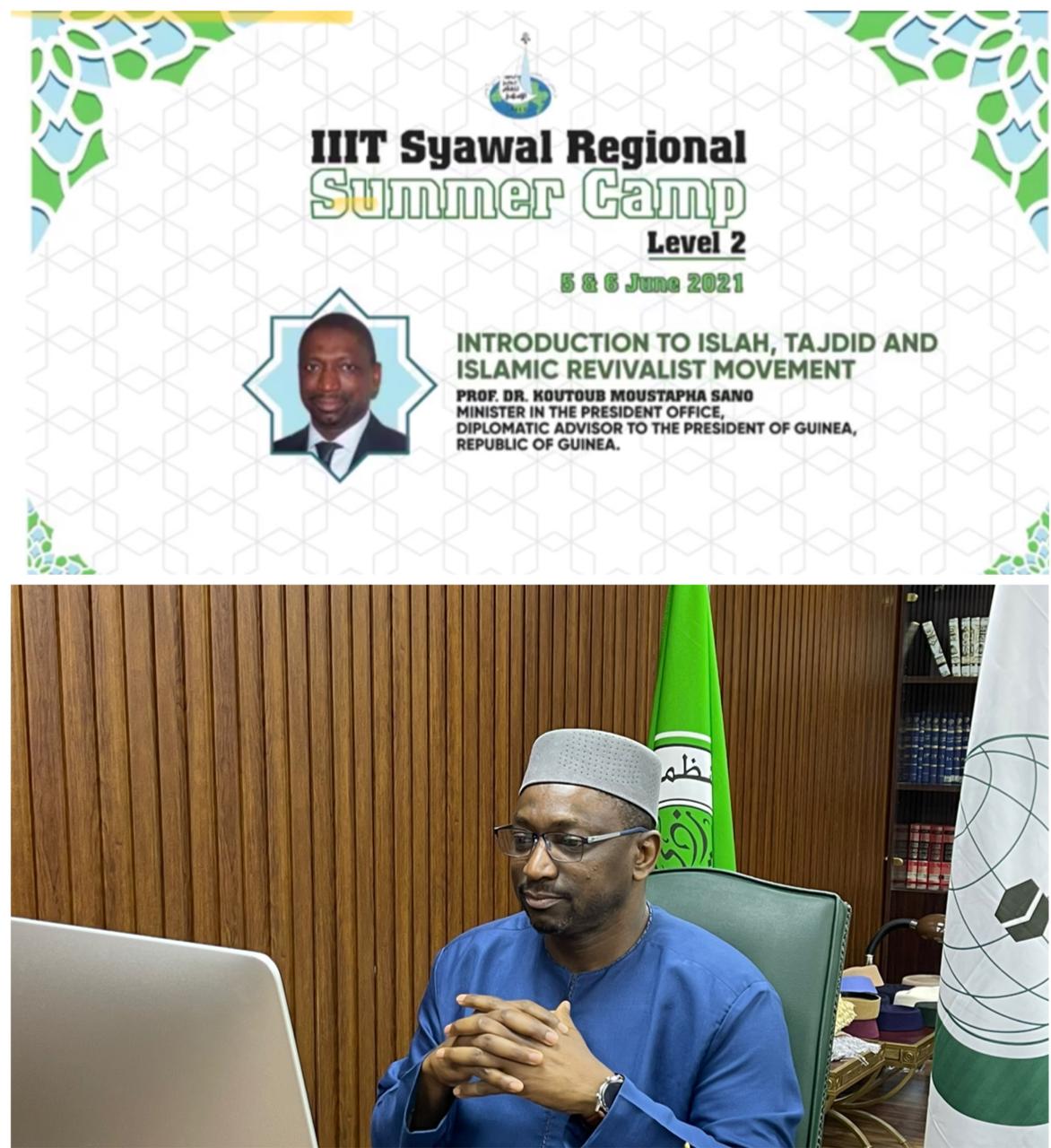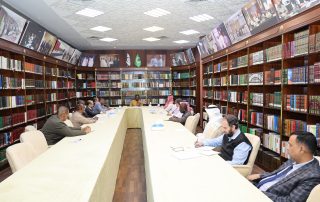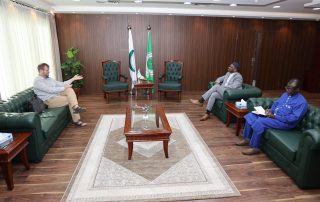
At the kind invitation of the Regional Office of the International Institute of Islamic Thought in Southeast Asia, H.E. Prof. Koutoub Moustapha Sano, Secretary General of the Academy delivered a lecture entitled “Introduction to Reform and Renewal” on Sunday, 25 Shawal 1442 corresponding to 6 June 2021. This lecture was held within the framework of the institute’s training and leadership program, called the Summer Camp.
His Excellency started his lecture by expressing his thanks for the esteemed outreach efforts made by the founding generation of the International Institute of Islamic Thought, led by the great thinkers Dr. Abdul Hamid Abu Suleiman, Dr. Ahmed Totonji, Dr. Hisham Al-Talib, Dr. Omar Kasouli, Mr. Anwar Ibrahim and those who have been involved in the development of the Institute, and passed away before them to the House of Abode, Allah willing, such as Dr. Ismail Al-Farouqi, Dr. Jamal Barzanji, Dr. Taha Jaber Al-Alwani, Dr. Mona Abu Al-Fadl, Hamad Hajj Belkacem and others. These thinkers understood very early on that the complex crises that the Islamic Ummah and the whole world are currently suffering from are essentially an intellectual crisis, while the other economic, political, cultural and educational crises are in fact repercussions and manifestations of the original crisis, which is the crisis of the Muslim mind, as the title of one of Dr. Abu Suleiman’s books published in the beginning of this century indicates. His Excellency used it to refer to the fact that the International Institute of Islamic Thought is a reference for reform and renewal thinking at the level of institutions inside and outside the Muslim world.
His Excellency then addressed the analysis and approximation of the meaning of the terms reform and renewal, stressing the importance of knowing the meaning of these two terms before entering into the details of the conference. Meanwhile, he stressed that the term reform is the opposite of the terms corruption and corruptibility, and also means that reform is a serious attempt to eliminate corruption the fact and end corruption the result. In other words, corruption and corruptibility are an emergency that is not original and must be removed and eliminated in order to bring things back to their natural state before corruption can infiltrate them, for example, lying is corruption, laziness is corruption, and cheating is corruption, etc. The elimination of these corruptions is called reformation, i.e. the return of everyone to what they were before, i.e. justice, honesty, work, etc. It is a disease and an evil that must be cured, and its remedy is reform. As for renewal, it is a matter of eliminating corruption and continuing the march of construction so that it becomes again what it was in the beginning. Thought, character and behavior are affected by corruption as are clothes, house and home, and restoring all these to their original state is called renewal. As for the cause of wear and tear, it is due to the owner of the house who neglects maintenance and fails in his duty to repair. Therefore, reform and renewal are complementary, closely related and intertwined.
If we look at the reality of the Ummah and the world, we see that reform is necessary because of the abundance of corruption in all its forms. There is corruption in the economy, in human society and in politics. There is corruption in thought, behavior and morals, and there is no stability, security or prosperity without reform. It is necessary to renew thought and methodology to be able to resist, overcome and repel corruption.
Then, His Excellency clarified that the work of a person who advocates reform is similar to that of a doctor, because the reformer is in fact a doctor, and it is known that the doctor does not provide a medical prescription before examining the patient and determining the type of disease and the appropriate medicine for him, therefore, the reformer must do with the same task as the doctor, starting with identifying the reality of corruption, its cause and its roots in order to determine the appropriate treatment for it, taking into account the degree of time necessary for effective treatment.
Therefore, any reform that does not proceed from this approach, will not bear fruit and will not be successful. His Excellency also mentioned the importance for the reformer to have a lot of knowledge, dreams, wisdom and firmness, stressing that science is the basis of reform and renewal and that no one can practice it if he is not aware of the reality of corruption, its degree and its roots. He cannot determine the appropriate treatment if he is also ignorant, and in this regard must be patient and not rush, just like a doctor who gives the patient a medicine in prolonged doses.
His Excellency also explained that the word of the Almighty: “Invite to the way of your Lord with wisdom and good instruction, and argue with them in a way that is best.” relates the most important pillars of reform, the foundations of dawah, and the pillars of renewal. The commitment of the reformer, renovator and caller to wisdom, good exhortation and argument with kindness is a safety valve, a guarantee and a sign of success. Therefore, it is necessary for all those who want to carry out this eternal divine mission to adhere to these foundations and start from them to achieve the desired goals and objectives of reform, renewal and dawah.
His Excellency concluded his lecture by reiterating the call not to import ready-made solutions and to abandon experiments on contradictory facts. There is no more detrimental to reform, change and renewal than the scourge of generalization and abandonment, haste and haste. Be like a doctor if you want to be a successful reformer, and a brilliant one. Get to know the facts in which you live, know the means of reform and renewal available, and above all know the reality of corruption, its roots and causes, and then arm yourself with the aforementioned foundations. Thus, His Excellency concluded his one and a half hour lecture by answering questions asked by the participants from Southeast Asian countries.
Read Also
Lastest








